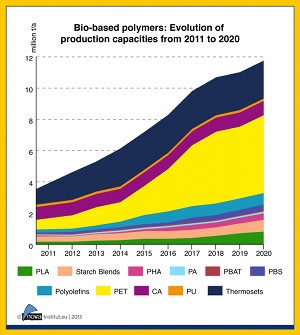 The nova-Institute carried out the market study of bio-based polymers in collaboration with renowned international experts. It is the first time that a study has looked at every kind of bio-based polymer produced by 247 companies at 363 locations around the world and it examines in detail 114 companies in 135 locations.
The nova-Institute carried out the market study of bio-based polymers in collaboration with renowned international experts. It is the first time that a study has looked at every kind of bio-based polymer produced by 247 companies at 363 locations around the world and it examines in detail 114 companies in 135 locations.Considerably higher production capacity was found than in previous studies. The 3.5 million tonnes represent a share of 1.5% of an overall construction polymer production of 235 million tonnes in 2011. Current producers of bio-based polymers estimate that production capacity will reach nearly 12 million tonnes by 2020. With an expected total polymer production of about 400 million tonnes in 2020, the bio-based share should increase from 1.5% in 2011 to 3% in 2020, meaning that bio-based production capacity will grow faster than overall production.
The most dynamic development is foreseen for drop-in biopolymers, which are chemically identical to their petrochemical counterparts but at least partially derived from biomass. This group is spearheaded by partly bio-based PET (Bio-PET) whose production capacity will reach about 5 million tonnes by the year 2020, using bioethanol from sugar cane. The second in this group are bio-based polyolefins like PE and PP, also based on bioethanol. But "new in the market" bio-based polymers PLA and PHA are also expected to at least quadruple the capacity between 2011 and 2020. Most investment in new bio-based polymer capacities will take place in Asia and South America because of better access to feedstock and a favourable political framework. Europe's share will decrease from 20% to 14% and North America’s share from 15% to 13%, whereas Asia's will increase from 52% to 55% and South America's from 13% to 18%. So world market shares are not expected to shift dramatically, which means that every region of the world will experience development in the field of bio-based polymer production.

Michael Carus, managing director of nova-Institute, reacted to the survey results thus: "For the very first time we have robust market data about worldwide production capacity of all bio-based polymers. This is considerably higher than in previous studies, which did not cover all polymers and producers. The forecast of a total capacity of 12 million tonnes by 2020 - a tripling of 2011 levels - suggests that bio-based polymers are definitely polymers for the future. It is also shown that the development of bio-based polymers is still very dynamic. Only five years ago, nobody would have expected bio-PET to grow to the biggest group among the bio-based polymers due to an initiative by one big brand-owner. This could happen again with any other bio-based polymer. PLA and PHA also have a remarkable growth ahead of them, even without the existence of such a 'supply chain captain'."


